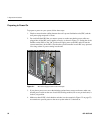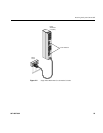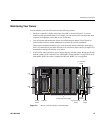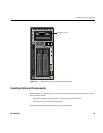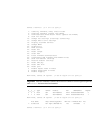
60 007-4857-002
2: Operation Procedures
Warning: You can add or replace only the items listed in this section. For your safety and
for the protection of your server system, contact your SGI system support engineer (SSE) to
install any hardware items not listed in this section.
Warning: Before installing, operating, or servicing any part of this product, read the
“Safety Information” on page 165.
I/O Blade Overview
System I/O is primarily accomplished through standard and optional blades in the SGI Altix 450
IRUs. The PCI, PCI-X and PCIe based I/O sub-systems, are industry standard for connecting
peripherals, storage and graphics to a processor blade. These are the primary configurable I/O
system interfaces for the Altix 450 series systems:
• The IA/IA2 blade (base I/O) used in the Altix 450 system includes two half-height
PCI/PCI-X slots. The two option cards install adjacent to the system disk and DVD drives
that are also resident in the IA blade. The IA2 blade differs from the original IA base I/O in
that it supports RAID 1 disk mirroring and DVD-R/W capabilities.
• The optional three-slot PCI/PCI-X double-wide blade holds three sled-mounted PCI/PCI-X
cards for easy insertion and extraction from the system. It is only used in A450 systems that
have more than one IRU.
• The optional single-wide two-slot PCI-X blade supports two PCI or PCI-X option cards.
• The optional single-wide PCI express (PCIe) blade supports two optional PCI express cards.
• The optional double-wide PCI express (PCIe) blade is used only in Altix 450 systems with
two or more IRUs. It houses two PCIe slots and two PCI-X slots. Note that use of two PCIe
(3D) graphics cards in this blade precludes using the two PCI-X slots due to space
limitations.
Not all blades may be available with your system configuration. Check with your SGI sales or
service representative for availability. See Chapter 6, “Maintenance and Upgrade Procedures” for
detailed instructions on installing or removing PCI cards and blades.



